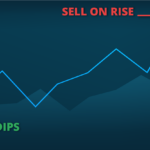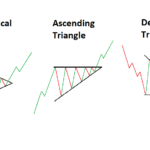Who will win the US election?
Normally, we here at the Queensway academy blog write articles regarding a variety of topics that directly deal with financial issues – markets, tips and so on or issues that may end up having an impact on those topics.
But sometimes we have to venture outside our comfort zone, and the U.S elections, which are a couple of months away, is the perfect opportunity to do so.
In this 3-part series of articles, we will take a look at some of the financial implications of the upcoming elections and their potential impact on both the US economy, as well as the global one.
We will look at what we view as the 3 potential outcomes – A Trump win, A Biden win and a prolonged battle with no clear result – either due to various disputes or through a lengthy vote tallying process due to mail-in voting on account of the COVID-19 epidemic.
Notwithstanding, we find it important to stress the following: we will endeavour to steer clear of politics; these will not be pro-Trump or pro-Biden articles per se (or anti candidate). We aim to have these articles look at either candidate’s current & future financial plans (and in Trump’s case — past performances) and not their political stance.
So, let’s dive in and begin with a look at the 45th President of the United States Of America: Donald J. Trump.

Why the Stock Markets Love Trump
When Trump’s predecessor relinquished the presidency, he did so in the middle of an undeniable streak of growth in the wake of the 2008 global marketA location or entity where people and entities can negotiate and trade assets of value. collapse.
In February 2009 the Dow JonesA business and financial news & analysis company that publishes the Dow Jones 30 index, which tracks... index hit 7062.93, its lowest level since mid-1997. By the time Obama was re-elected the Dow was up to 12,588 points and higher, and when the time came for Obama to hand over the reins, the Dow was sitting at nearly 20,000 points, and excitement in the business world was palpable over Trump’s win.
Trump, for all his bluster and boisterous nature, was viewed as a business world candidate, which was also partly down to how he had “sold” himself during his campaign. He claimed he would quit treaties and deals that were not in the US’ favour and procure better ones through his negotiation skills.
And markets reacted to those words with excitement and anticipation.
Throughout his tumultuous first term, Trump’s impact on global markets was undeniable: he threatened and then, for a little while, started what may technically qualify as a “trade war” with China; he backed out of the Paris climate accords, navigated the creation of a new version of NAFTA (USMCA) and made countless other moves to help bolster what he believed to be the US’ most important assetA stock, commodity, currency, index or any other entity one may trade or invest in. – its’ economy.
Trump has made remarks that indicate his staunch supportThe price level that traders believe represents the lowest value an asset can reach. At this point, ... in trickle-down economics; he has also made moves across the duration of his term of office to support that view – made changes to tax codes, dismantled restrictions on large corporations and other actions that were designed to continue the record streak of economic growth the country was going through.
How 2020 Impacted Trump’s Election Odds
Being the mastermind spin artist that he is, one could easily imagine a path in which Trump uses those successful deals and tax cuts to his benefit come election time, even if some of his supporters still don’t feel the benefit in their own pockets.
But then 2020 rolled around, and the economy scratched to a halt like a cartoon hitting an invisible brick wall. It was all due to the COVID-19 pandemic (and a couple of other issues we will not touch upon as they are not directly related to the economy).

The Dow Jones, which was on the precipice of 30,000 points for the first time in history in mid-February, fell more than 10,000 points in a month, reaching 18,591.93 by late March, essentially losing all the gains of Trump’s previous years in office. New jobless claims also spiked in late March, going from a few thousand up to nearly 7 million in the space of a single week, and nearly all financial indicators were pointing downwards.
These and other signs all created a situation which, not only adversely affected Trump’s re-election, but also made future financial growth much more difficult, should he win a second term.
The US has so far approved several trillion dollars’ worth in aid programs to cover anything from increased unemployment benefits to aid for SMB’s and large corporations. While markets, job numbers and other indicators seem to be stabilising somewhat, we must consider two things: the pandemic is still currently raging in the US and has not been contained, so it is entirely conceivable that further aid packages will be needed before the election.
But even more importantly, no matter how much aid has been (and will be) granted, the time will come when Peter would like to claim back whatever he “loaned” to Paul, or in other words – the trillions in emergency funds will obviously come at the expense of other government expenditures.
So even if Trump wins re-election, he will head into 2021 with an economic future that is far less certain and much more complicated than he previously had to deal with.
Can the Economy Carry Trump To Win?

The COVID-19 pandemic put a major wrench in Trump’s economic plans for the future. We still do not know, nor can we estimate the overall damage it will cause the U.S. economy; and with no vaccine or end date in sight, we can’t even begin to venture any sort of guesses on that front.
But let us focus on what we do know: The election will officially be held November 3rd and, should Donald Trump emerge victorious, he will have a hard road ahead of him.
We have already pointed out that any economic plans he may have had will have to be put on hold, at least for a little while, as the nation struggles to recover from the pandemic. So how does Trump theoretically go into his second term attempting to fix COVID-19 damages and continuing his economic success?
We are not fortune tellers, but it would seem that the likeliest path for him to take is to cut further into the national deficitA trade balance that is negative as a result of cost (imports, on the national level) being greater ... and enact national employment plans similar to those that arose from the Great Depression.
Trump’s own previous record makes it rather unlikely that he suddenly switches stance and reverts to more supportive welfare structures; so virtually his only path to recovery is through jobs creation and economic stimuli.

We’ve mentioned that Trump has shown an affinity to trickle-down economics, and he may choose to go that route again – offering further assistance to large companies in the form of tax breaks the like. But it is doubtful that such stimuli (even if they do work, which economists debate constantly) would suffice in such a crisis. Trump would almost assuredly have to resort to some form of nationalised work projects, particularly if the pandemic lasts into 2021 and continues to wreak havoc on employment.
He might not be successful in pulling off such a remarkable feat but, should he be able to, he will be setting up whoever follows him in the Republican party for a win in 2024. And listening to his speeches – he’d like nothing more than that.
In our next article, we will look at Joe Biden, his past work in the office and how he may act should he win the presidency in November.











